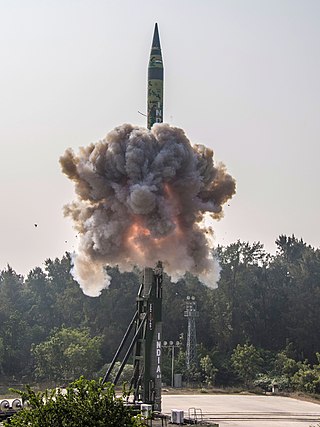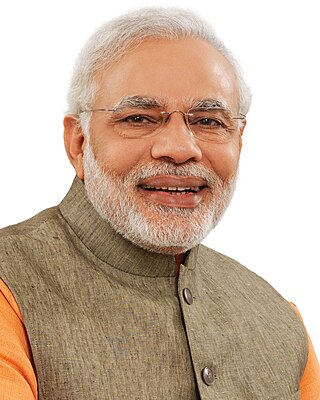
In nuclear ethics and deterrence theory, no first use (NFU) refers to a type of pledge or policy wherein a nuclear power formally refrains from the use of nuclear weapons or other weapons of mass destruction (WMD) in warfare, except for as a second strike in retaliation to an attack by an enemy power using WMD. Such a pledge would allow for a unique state of affairs in which a given nuclear power can be engaged in a conflict of conventional weaponry while it formally forswears any of the strategic advantages of nuclear weapons, provided the enemy power does not possess or utilize any such weapons of their own. The concept is primarily invoked in reference to nuclear mutually assured destruction but has also been applied to chemical and biological warfare, as is the case of the official WMD policy of India.

Narendra Damodardas Modi is an Indian politician serving as the current prime minister of India since 26 May 2014. Modi was the chief minister of Gujarat from 2001 to 2014 and is the Member of Parliament (MP) for Varanasi. He is a member of the Bharatiya Janata Party (BJP) and of the Rashtriya Swayamsevak Sangh (RSS), a right-wing Hindu nationalist paramilitary volunteer organisation. He is the longest-serving prime minister outside the Indian National Congress.

Ajit Kumar Doval is a bureaucrat, former spymaster and the current National Security Advisor (NSA) of India. Doval is the longest serving NSA, currently serving his third consecutive five-year term since he was first appointed in May 2014 following the election of Narendra Modi as the Prime Minister of India. He is a former Director of the Intelligence Bureau (IB) and former Indian Police Service (IPS) officer from the Kerala cadre.

Krishnaswamy Subrahmanyam was a prominent international strategic affairs analyst, journalist and former Indian civil servant. Considered a proponent of Realpolitik, Subrahmanyam was an influential voice in Indian security affairs for a long time. He was most often referred to as the doyen of India's strategic affairs community, and as the premier ideological champion of India's nuclear deterrent. His son S Jaishankar was appointed India's External Affairs Minister in 2019.
The National Security Council (NSC) of India is an executive government body tasked with advising the prime Minister of India on matters of national security and foreign policy. It was established by the former prime minister of India Atal Bihari Vajpayee on 19 November 1998, with Brajesh Mishra as the first National Security Advisor.

Relations between India and the United States date back to India's independence movement and have continued well after independence from the United Kingdom in 1947. Currently, India and the United States enjoy close relations and have deepened collaboration on issues such as counterterrorism and countering Chinese influence in the Indo-Pacific.

The bilateral relations between the Himalayan Kingdom of Bhutan and the Republic of India have been traditionally close and both countries share a "special relationship", making Bhutan a protected state, but not a protectorate, of India. India remains influential over Bhutan's foreign policy, defence and commerce. Bhutan is the largest beneficiary of India's foreign aid.

Agni-V is a land based nuclear MIRV-capable Intercontinental Ballistic Missile (ICBM) developed by the Defence Research and Development Organisation (DRDO) of India. The missile has a range of more than 7,000 km. It is a three-stage, road-mobile, canisterised and solid-fuelled ballistic missile. It is one of the fastest missiles in the world, reaching speeds up to 29,400 km/hr.
Content from the United States diplomatic cables leak has depicted India and related subjects extensively. The leak, which began on 28 November 2010, occurred when the website of WikiLeaks – an international new media non-profit organisation that publishes submissions of otherwise unavailable documents from anonymous news sources and news leaks – started to publish classified documents of detailed correspondence – diplomatic cables – between the United States Department of State and its diplomatic missions around the world. Since the initial release date, WikiLeaks had been releasing further documents daily.

Subrahmanyam Jaishankar, better known as S. Jaishankar, is an Indian diplomat, politician and author, who is serving the thirtieth Minister of External Affairs of the Government of India since 31 May 2019. He is a member of the Bharatiya Janata Party and has been a Member of Parliament in the Rajya Sabha since 5 July 2019. He previously served as the Foreign Secretary from January 2015 to January 2018.

The First Narendra Modi ministry is the Council of Ministers headed by Narendra Modi that was formed after the 2014 general election which was held in nine phases from 7 April to 12 May in 2014. The results of the election were announced on 16 May 2014 and this led to the formation of the 16th Lok Sabha. The Council assumed office from 27 May 2014.

The foreign policy of the Modi government, also referred to as the Modi doctrine is associated with the policy initiatives made towards other states by the current government of India after Narendra Modi assumed the office of prime minister on May 26, 2014.

The most significant initiative made by the Narendra Modi government is the focus on neighbouring countries and major Asian powers coupled with emphasizing on the two decades old Look East policy. Asia being the major focus area of his foreign policy, Modi and his foreign minister chose several Asian countries for their initial bilateral visits. He has made state visits to Bhutan and Nepal and Japan within the first 100 days of his government and also hosted Asian leaders like former Prime Minister Tony Abbott of Australia, President Xi Jinping of China and Prime Minister Nguyễn Tấn Dũng of Vietnam, apart from inviting SAARC leaders in his inauguration ceremony. External Affairs Minister Sushma Swaraj has also made official visits to several Asian capitals like Dhaka, Bangladesh, Kathmandu, Nepal, Naypidaw, Myanmar, Singapore, Hanoi, Vietnam, Manama, Bahrain, Kabul, Afghanistan, Dushanbe, Tajikistan, Malé, Maldives, Abu Dhabi, United Arab Emirates, Seoul, South Korea and Beijing China.

Neighbourhood First Policy of India is a core component of India's foreign policy. It focuses on peaceful relations and collaborative synergetic co-development with its South Asian neighbours of the Indian subcontinent encompassing a diverse range of topics, such as economics, technology, research, education, connectivity, space program, defence security, environment and climate challenge. This policy creates new avenues as well as leverages to the existing regional cooperation initiatives such as SAARC, SASEC, BBIN, and BIMSTEC. It compliments India's Look East policy focused on Southeast Asia and Look West Policy focused on Middle East.

The premiership of Narendra Modi began 26 May 2014 with his swearing-in as the Prime Minister of India at the Rashtrapati Bhavan. He became the 14th Prime Minister of India, succeeding Manmohan Singh of the Indian National Congress. Modi's first cabinet consisted of 45 ministers, 25 fewer than the previous United Progressive Alliance government. A total of 21 ministers were added to the council of ministers on 9 November 2014.
The Defence Cyber Agency (DCyA) is an integrated tri-services agency of the Indian Armed Forces. Headquartered in New Delhi, the agency is tasked with handling cyber security threats. The DCyA draws personnel from all three branches of the Armed Forces. The head of the DCyA is an officer of two-star rank, and reports to the Chief of Defence Staff (CDS) through the Integrated Defence Staff (IDS).

The Defence Space Agency (DSA) is an integrated tri-services agency of the Indian Armed Forces headquartered in Bengaluru, Karnataka, India. The agency is tasked with operating the space-warfare and Satellite Intelligence assets of India. The DSA draws personnel from all three branches of the Armed Forces.
SAGAR, used as a backronym or reverse acronym which stands for Security and Growth for All in the Region, is a label used by the Prime Minister and Government of India for India's vision and geopolitical framework of maritime cooperation in the Indian Ocean region. Sagar means 'ocean' or 'sea' in multiple Indian languages. Since the first usage of the phrase in 2015 at Port Louis by Prime Minister Narendra Modi the term has been adapted to include more elements such as linkages with the Indo-Pacific region.
Atmanirbhar Bharat, which translates to 'self-reliant India', is a phrase the Prime Minister of India Narendra Modi and his government used and popularised in relation to the country's economic development plans. The phrase is an umbrella concept for the Modi government's plans for India to play a larger role in the world economy, and for it to become more efficient, competitive and resilient.

The 2+2 Ministerial Dialogue is a diplomatic summit that has been held every year since 2018 initially between the Minister of External Affairs or Foreign Minister, and Defence Minister of India with the Secretary of State and Secretary of Defense of the United States to discuss and work on common issues of concern to improve and strengthen India–United States relations.
![Bharat Karnad participating the 2019 Yushan Forum held in Taipei, Taiwan. Bharat Karnad (10.09 Fu Zong Tong Zhu Chi [{Ya Zhou Qian Zhan } Yuan Zhuo Dui Hua ] - Flickr id 48868658721).jpg](http://upload.wikimedia.org/wikipedia/commons/thumb/b/b6/Bharat_Karnad_%2810.09_%E5%89%AF%E7%B8%BD%E7%B5%B1%E4%B8%BB%E6%8C%81%E3%80%8C%E3%80%8E%E4%BA%9E%E6%B4%B2%E5%89%8D%E7%9E%BB%E3%80%8F%E5%9C%93%E6%A1%8C%E5%B0%8D%E8%A9%B1%E3%80%8D_-_Flickr_id_48868658721%29.jpg/220px-Bharat_Karnad_%2810.09_%E5%89%AF%E7%B8%BD%E7%B5%B1%E4%B8%BB%E6%8C%81%E3%80%8C%E3%80%8E%E4%BA%9E%E6%B4%B2%E5%89%8D%E7%9E%BB%E3%80%8F%E5%9C%93%E6%A1%8C%E5%B0%8D%E8%A9%B1%E3%80%8D_-_Flickr_id_48868658721%29.jpg)















